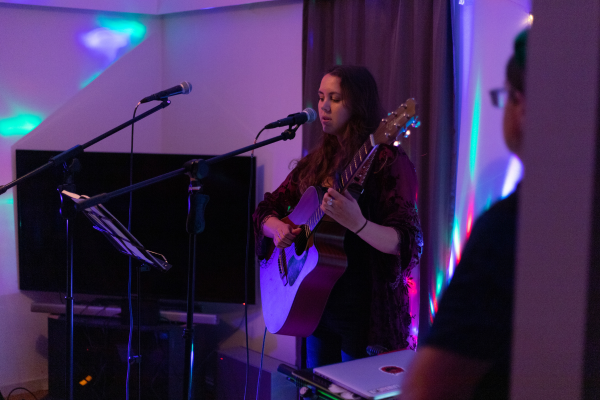
You already have a voice. Let’s make it shine.
Vocal coaching for adults in Auckland and online.
Let your voice transform you.
An Evolving Practice
This video was filmed when my studio was called Auckland Contemporary Singing School, and when I worked with both adults and younger singers.
Over time, my work evolved — and so did my focus. Today, The Functional Singer is dedicated exclusively to adult singers.
My approach, values, and teaching philosophy remain the same, but my practice is now designed specifically for the needs, bodies, and learning styles of adults.
Develop a healthy, expressive, intuitive singing voice — through a clear, evidence-informed method designed specifically for adult singers.
Most adult singers feel stuck — not because they lack talent, but because they were never taught in a way that makes sense for adults.
Maybe you…
feel tension or strain when you sing
get confused by mixed advice and YouTube exercises
feel embarrassed or unsure about your voice
think you’re “too old to start”
wish singing felt natural, intuitive, and free
want to express yourself but don’t trust your voice
It’s not your fault.
Most vocal training wasn’t designed for adult learners.
You just need a method that finally brings clarity — without strain, guesswork, or shame.
A simple path to becoming the singer you want to be
1. Book your first session
We explore your voice, your goals, and the songs you love — and you’ll experience your first guided vocal lesson so you know exactly what’s possible for you.
2. Learn step-by-step with a clear method
This is not surface-level singing advice. You’ll train through a clear, structured process that explores the real mechanics, emotions, and artistry of your voice.
3. Sing with confidence, freedom, and real artistic skill
Develop the voice you’ve always wanted — reliable, expressive, intuitive — and grow into a true vocalist who can interpret, perform, and create with confidence.
WHY THIS WORKS
A method designed for the way adult singers learn best
Most vocal training was created for children or young performers — not for adults with fully developed bodies, nervous systems, and learning styles.
That’s why so many adults feel tension, confusion, or embarrassment when they try to sing.
My approach is different.
I blend functional voice science, somatic awareness, artistic development, and healing-based practices to help you understand how your voice works and why it behaves the way it does.
This makes the learning process clearer, deeper, and far more intuitive.
You’ll learn to:
release unhelpful tension
build healthy, natural coordination
connect your voice and body
understand the mechanics behind your sound
interpret songs with confidence and authenticity
develop true technical and artistic skill
This isn’t “quick tips” or vague imagery — it’s a clear, evidence-informed process that helps adults transform their voice from the inside out.
The result?
A voice that feels natural, reliable, expressive — and uniquely yours.
Imagine what singing could feel like
Imagine having a voice that is reliable, expressive, and intuitive — a voice you understand and can trust in any context.
Imagine singing the songs you love without strain or second-guessing, and feeling confident enough to perform, interpret, and create like a true vocalist.
Imagine finally feeling connected to your body, your sound, and your artistic identity.
This is what becomes possible when you train with a method designed for adult singers:
you don’t just learn to sing — you grow into the artist you’ve always wanted to be.
Ready to begin?
You already have a voice worth hearing.
With the right guidance, it can shine with confidence, ease, and real artistic expression.
If you're ready to develop the voice you’ve always wanted —
I’d love to support you.
What adult singers say about this work
“I’ve noticed a significant improvement in my vocal strength and projection since working with Jorgelina. She teaches healthy, sustainable technique, and that’s exactly what I was looking for. My voice no longer feels fatigued or uncomfortable after a singing lesson. Her focus on mind–body connection has been especially impactful, helping me release tension and understand my voice in a more holistic way. I’m really grateful for the progress I’ve made under her guidance and highly recommend her as a singing teacher”
Susie Coplay
“Jorgelina is a wonderful teacher and took me as complete novice to singing in front of an audience of a hundred people in 2 months! Muchas Gracias”
Mike Brewer
“I’ve noticed a significant improvement in my vocal strength and projection since working with Jorgelina. She teaches healthy, sustainable technique, and that’s exactly what I was looking for. My voice no longer feels fatigued or uncomfortable after a singing lesson. Her focus on mind–body connection has been especially impactful, helping me release tension and understand my voice in a more holistic way. I’m really grateful for the progress I’ve made under her guidance and highly recommend her as a singing teacher”
Susie Coplay
I really struggled with the high notes before coming to Jorgelina! She's coached me through so many techniques and although there is so much to learn I feel like I've seen lots of progress already. My confidence has grown massively since joining the group classes too and she encourages performing at every opportunity. I love that Jorgelina takes a holistic approach to singing and understands that it's not just about sounding great, the voice also has strong connections to the body and mind. Thanks Jorgelina!
Jess Reeve-Taylor




